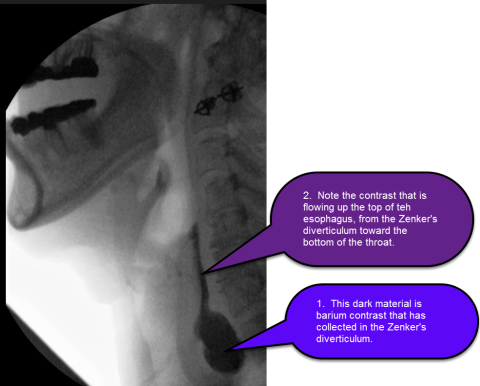Zenker's Diverticulum
Find Your Care
We work as a team to provide outstanding esophageal care. Call 833-373-7674 to connect with a specialist at the UCLA Robert G. Kardashian Center for Esophageal Health.
What is Zenker’s diverticulum?
A diverticulum is an abnormal out-pouching or pocket forming off the wall of the gastrointestinal wall. A Zenker’s diverticulum is a pouch that forms in the throat at the very beginning of the digestive tract just above the upper esophageal sphincter (UES).
What causes Zenker’s diverticulum?
The cause of Zenker’s diverticulum is abnormal tightening of the upper esophageal sphincter (also called the cricopharyngeus muscle). As a result of tightening of this muscle, pressure builds along the wall of the throat above this sphincter muscle. Just above this muscle there is a relative weak point of the throat wall and the diverticulum forms as a result of the relative increased pressure exerted on this weak area during swallowing. Because the UES below the pouch is tighter than normal, food and liquids are harder to pass into the esophagus and instead tend to pass into the diverticulum pocket or even back into the throat causing regurgitation.
What are the symptoms of Zenker’s diverticulum?
Symptoms include difficulty swallowing, feeling swallowed material sticking in the throat, regurgitation, weight loss, bad breath, choking, and coughing. Swallowed material may accumulate in the diverticulum and be regurgitated long after a meal. Pills may be difficult to swallow. Some people with a Zenker’s diverticulum may have only mild symptoms but over time the pouch continues to grow and becomes more symptomatic.

How is Zenker’s diverticulum diagnosed?
Zenker's diverticulum is diagnosed during upper endoscopy (EGD) or esophagram (aka barium swallow), or a modified barium swallow study (aka videofluoroscopic swallow study) (see figure). These tests complementary during investigation of swallowing problems.
What are the treatment options for Zenker’s diverticulum?
The goal of treatment of Zenker’s diverticulum is to relieve the obstruction to swallowing caused by the tight UES and eliminate the preferential passage and accumulation of swallowed material into the diverticulum. For a large or complicated diverticulum, open neck surgery may be necessary to remove the diverticulum sac (Zenker’s diverticulectomy), but most patients with symptomatic Zenker’s diverticulum are now treated in a minimally invasive endoscopic approach. Endoscopic cricopharyngeal myotomy (diverticulotomy) has become a primary and important means of treatment of Zenker’s diverticulum. This procedure involves cutting the tight UES muscle and the party wall between the esophagus and the pouch to eliminate the obstruction. This procedure remodels the anatomy of the esophagus relative to the diverticulum so that swallowed material easily passes from the diverticulum into the esophagus.